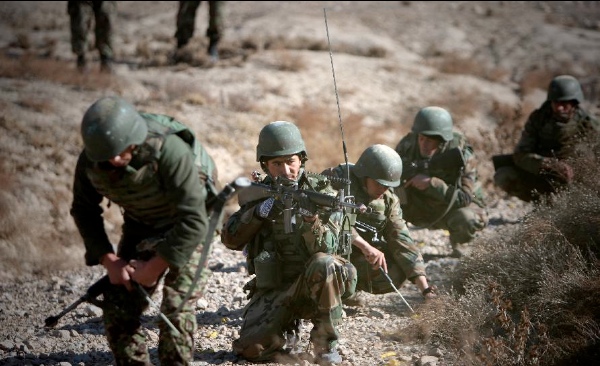What Are Chinese Foot Soldiers Doing In Afghanistan?

NEW DELHI: As NATO and US heads for its diplomatic termination as ‘boots on the ground’ in Afghanistan, a new player has already started deepening its integration. Military reports have suggested that China has become overtly active in Afghanistan in the past few months. In fact, Chinese troops are operating with their Afghan counterparts on carrying on counter terror operations.
A report in Military Times states that “there is mounting evidence that Chinese ground troops are operating inside Afghanistan, conducting joint counter-terror patrols with Afghan forces along a 50-mile stretch of their shared border and fueling speculation that Beijing is preparing to play a significantly greater role in the country's security once the U.S. and NATO leave.”
There are two interesting facts that need to be discussed regarding this major development. Firstly, the US has concrete idea regarding it and yet is unwilling to discuss it out. “We know that they are there, that they are present,” a Pentagon spokesman reportedly said.
Secondly, China is quite ambiguous, as it should rightly be, regarding its involvement, trying to hush it up from the international media.
This development is quite interesting, especially during this time when both US and China are already involved in a silenced conflict in the South China Sea. Adding to it, the Iranian and Russian activity that has become now an integral part of Afghanistan’s political reality would also have an impact. Political analysts though believe that this kind of ‘arrangement’ between US and China in Afghanistan, might interestingly, be mutually beneficial for both of them in the long run.
Though, what US does need to pay attention to are special areas such as Kabul (where NATO headquarters are based), Jalalabad Airfield, Bagram Airfield, Kunduz, Kandahar and Camp Shorbak. As of now, evidence regarding Chinese patrolling units has been validated in the barren plateau called Little Pamir in Afghanistan. In spite of Chinese military vehicles like Norinco VP 11a and Dongfeng EQ 2050 that have been spotted in Afghanistan, China has openly stated that such counter-terrorism operations are not being conducted, as of now.
Though, in January 2017, there was a largely overlooked news did circulate in the media. It reported that Chinese officials had rescued one of the members of the Special Forces on US in Afghanistan. Though, later, US did clearly negate any such incident. Nevertheless, it did reveal that both China and US, had been involved in the counter terrorism operations, needless to validate.
There are two concrete reasons why China is basically interested in Afghanistan, drowning it into the conflict. Firstly, China wants to erase the potential of the East Turkestan Islamic Movement, which is a Uyghur militant group that has been carrying out terrorist activities in China since 1949. In fact, even US had declared it as a terrorist organization in 2002. China definitely is very scared that if the coalition forces back off from Afghanistan, it would endow a potential for Uyghurs to grow in Afghanistan, a perceived reality that can happen in time. The slowly declining Western footprint in Afghanistan is a major concern for China, a fear that is often shared by the Chinese officials.
Secondly, the other concern is definitely security and stability in the region. Understanding it very well that Afghanistan is a geo-political hotspot, China is not ready to take chances. Taking time would only worsen the political situation further and it would also impact on China’s relations with Pakistan in the long run.
Nevertheless, it is a difficult issue for Pentagon. On one hand, the US does want China’s military assistance in Afghanistan, but at the same time, the rambling in South China Sea cannot be tolerated. As of now, what US can or cannot tolerate, as of now, would be deciphered by time itself.
Meanwhile, China hosted a delegation of top Afghan Taliban leaders recently as part of its efforts to encourage the militant group to join the peace process, media reports have said. The five-member delegation led by Afghan Taliban's Qatar office chief Sher Abbas Stanikazai included Maulvi Shahabuddin Dilawar, Jan Muhammad Madani, Salam Hanafi and Saleh, the Express Tribune newspaper reported, quoting Taliban sources.
The Taliban Qatar office reportedly confirmed the meeting. "The visit was part of the relations of the political office with European countries such as Norway, Germany, France, Britain as well as neighbouring and regional countries," a Taliban source said as quoted by PTI. "But these relations are focused on bringing about peace in Afghanistan and resolving the issue through negotiations.”
Days after the Taliban trip, Chinese special envoy for Afghanistan, Deng Xijun, visited Kabul and met senior Afghan leaders including President Ashraf Ghani. "China has always conveyed to the Taliban during meetings that it recognises the Afghan government and the president and that talks are the only option for them," Deng reportedly told Ghani.
The above developments indicate China’s growing interest in Afghanistan, a move that seems to be silently welcomed by the US. This is perhaps because the US now has to counter growing Russian interest in Afghanistan, with Moscow chairing two high profile meetings on the future of Afghanistan, none of which included the US or Nato. Moscow has also reportedly reached out to the Afghan Taliban, indicating its desire to bring the militant group on the table as a stakeholder of the process. This effort has drawn sharp criticism from both Kabul and Washington, with commander of US forces in Afghanistan, General John Nicholson, outrightly blaming Russia for deteriorating security situation in the troubled country. Addressing a senate panel last month, Nicholson said that Russia was seeking to undermine the US and Nato in Afghanistan and added that there was concern “about the increasing level” of unspecified Russian support for Taliban insurgents.”



